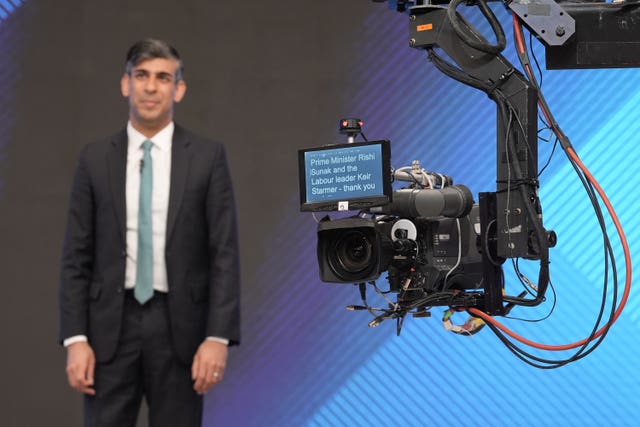Starmer to launch election manifesto as Sunak breaks from campaign for G7 summit
As Labour launches a manifesto centred on “wealth creation”, the Prime Minister will announce new funding for Ukraine, set out prior to the election.

Sir Keir Starmer is to launch his full General Election offer after saying it will not contain any “tax surprises” for voters.
Labour has said it will put “wealth creation” at the heart of the manifesto, with Sir Keir set to proclaim economic growth as his party’s “core business”.
The Labour leader will launch the document after polling showed he came out on top in the latest election broadcast event opposite Rishi Sunak – Sky News programme The Battle For No 10 on Wednesday night.
The Prime Minister is meanwhile taking a break from campaigning and will head to a G7 summit in Puglia, Italy, where he is set to announce new funding for war-torn Ukraine.
Both party leaders faced jeers and tough questions from audience members as they took part in the programme, with Sir Keir was branded a “political robot”, while Mr Sunak was booed after claiming the junior doctors’ strike had an impact on NHS waiting lists.
Asked whether he felt sorry for Mr Sunak because he had to account for 14 years of Conservative governments, Lord Cameron said: “I don’t feel sorry for him because he’s a very effective Prime Minister who wants to go on doing his job.”
In a bid to calm nerves about the possibility of shock costs to voters, Sir Keir assured the programme audience he was not planning to put up fuel duty or capital gains tax, after he already ruled out raising income tax, national insurance or VAT in the next parliament.
“We’re going to unveil our manifesto tomorrow – no tax surprises, there’s going to be no need to raise tax on the plans we’re setting out,” Sir Keir told Sky News.
Thursday’s headline announcement is expected to include a pledge to cap corporation tax at its current rate of 25% to give businesses long-term certainty, the latest in a series of pledges not to raise tax.
Previously announced tax rises the party have set out include charging VAT on private school fees, abolishing the non-dom tax status and closing “loopholes” in the windfall tax on oil and gas companies.
On Thursday, Labour’s national campaign co-ordinator, Pat McFadden, said a council tax re-evaluation is “not something that we’re planning to do” and that “we refuse to accept defeat” on economic growth when asked whether the public should expect spending cuts if the party is elected.
During Sky News’ broadcast, one audience member criticised Labour leader Sir Keir for appearing to have become a “political robot”.
But Mr McFadden countered that a “sober” and “serious” leader is what the country needs.
“I don’t think he’s trying to be in the entertainment business, he’s trying to be a sober, serious leader, and that’s what he’ll be if he’s elected on the fourth of July,” Mr McFadden told GB News.

He was laughed at when he claimed inflation “was always meant to come down over time”, and was accused of spoiling the “hopes and dreams” of young people hoping to own a home.
The embattled Prime Minister insisted he will “keep fighting hard until the last day of this election” after being forced to say he had not lost hope of winning the contest.
“We’ve got a clear plan for the future to make a difference to people – to cut their taxes, bring down immigration, to protect pensions,” he added.
Mr Sunak will pause campaigning on Thursday as he heads to Italy to meet heads of state from the other G7 nations, Canada, France, Germany, Italy, Japan, and the United States.
There he will announce a £242 million package of assistance for Kyiv, allocated before called the election, aimed at meeting immediate humanitarian, energy and stabilisation needs in Ukraine and to lay the foundations for longer term economic and social recovery, and reconstruction.
Elsewhere on the campaign trail, Welsh nationalist party Plaid Cymru will launch its manifesto.
Ahead of the launch in Cardiff, Plaid leader Rhun ap Iorwerth said his party would “fight every day” for the billions owed to the country from the HS2 high-speed rail project, and for a fair funding model which “funds our country according to need, not population”.





